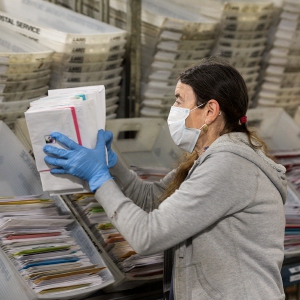Pandemic-era outdoor gear shortage lifts in Upper Valley
| Published: 05-11-2023 10:05 PM |
LEBANON — When Rick Hughes, of Etna, needed to upgrade to larger bikes for his three growing sons, he did what he’d done on nearly an annual basis since his oldest, Bodie, began biking: headed down to Omer and Bob’s outdoor gear store in downtown Lebanon to check out their selection. But this was the summer of 2020, and what he found took him by surprise.
“They only had one new bike there in the whole place and it had a ‘sold’ sticker on it,” Hughes said. “It was sad because we made the mistake of bringing our kids in there, and it was really disappointing for them. It was like taking kids to a candy store that had no candy.”
Disappointment and scarcity were recurring themes for many consumers looking for outdoor and sporting goods during the first half of the COVID-19 pandemic, as people looking to escape shutdowns and recreate while maintaining social distance streamed outdoors, buying up everything from bikes and kayaks to golf pull carts and hiking shoes on their way.
Fast-forward to 2023 and approaching the crucial summer season, the industry now finds itself in a vastly different position than it did during the pandemic-induced shortages of 2020 and 2021. Whereas shortages once was the overriding concern, it is now having too much product.
As the nation came to the realization that the early shutdowns of a couple weeks would drag on for the unforeseeable future, Americans headed outdoors. The Outdoor Industry Association, a trade group representing manufacturers, retailers and other outdoor-related organizations, last fall reported that outdoor participation has grown by nearly 7% since the pandemic began in early 2020.
“Everyone felt that the outdoors was a safe place to congregate,” said Bill Lockwood, general manager of ASOLO USA, the West Lebanon-based North American distributor of the Italian hiking footwear brand. “If they wanted to be with other people, getting outdoors was a safe way to get together.”
That surge in participation in the summer months of 2020 caught many in the outdoor industry by surprise.
“When (the pandemic) initially started and businesses started closing, we were unsure if we were actually going to be able to remain open,” said Breck Taber, co-owner of Omer and Bob’s. “When we opened back up, we started off with limited hours not knowing what was going to happen, and then things exploded for us. The demand for bikes went through the roof.”
Article continues after...
Yesterday's Most Read Articles
 Homeless Upper Valley couple faces ‘a very tough situation’
Homeless Upper Valley couple faces ‘a very tough situation’
 Lebanon’s Jewell back from auto accident, more aware of ‘drowsy driving’ dangers
Lebanon’s Jewell back from auto accident, more aware of ‘drowsy driving’ dangers
 Plan on track to ship Upper Valley mail to Connecticut for sorting
Plan on track to ship Upper Valley mail to Connecticut for sorting
 West Lebanon crash
West Lebanon crash
 Crane crash on Interstate 89
Crane crash on Interstate 89
The bike industry was unprepared for the onslaught of demand, and supplies evaporated “almost overnight,” according to Taber. The shortage became so dire for Omer and Bob’s that they had to get creative to fill their showroom floor with products of any kind.
“Where there normally would have been a bike rack or two, it was literally empty space,” Taber said. “It didn’t look good, so we basically accepted people’s used bikes and had this rolling consignment area.”
Taber said they also started carrying products, such as a line of backpacking coolers, that they hadn’t carried before just to make sure the store looked like it was still in business.
A surge in people wanting to hit the golf links led to Lebanon’s Golf and Ski Warehouse experiencing shortages in pull carts and increased lead times in custom steel shafts, according to the store’s buyer Chris House.
“Pull carts saw a huge spike, because at some courses two people weren’t allowed to drive in the same cart together,” House said. “We couldn’t keep them in stock. It was a very strange blip.”
And while pre-pandemic custom-fit steel club shafts normally took from five to 10 days to get in stock, House said turnaround times often ballooned to six to 10 weeks. Package sets — the typical value-price full sets of clubs containing everything beginners needed to start the game — were also in high demand due to the number of new players taking up the sport.
For ASOLO USA and Lockwood, the outdoor footwear industry’s struggles were summed up by one seemingly overriding concern.
“It was all about did you have a men’s size 10,” Lockwood said. “It got to the point where people didn’t care about color or even what product it was.”
While manufacturers attempted to ramp up production to meet increased demand, problems with the global supply chain made that difficult.
According to Lockwood, ASOLO USA was very optimistic about its 2022 hiking season given the increase in demand it had seen over the prior two years, but it ran headlong into shipping challenges. New products arrived late, missing the start of the season, said Lockwood. And the skyrocketing price of shipping — up to 10 times higher than average costs at one point — added an “outrageous” cost to the price of doing business.
A logjam of cargo ships at U.S. ports added significant delays to delivery times, and worse, created a shortage of shipping containers because so many of them were sitting on ships waiting to be offloaded.
Lockwood recalls hearing a story from industry sources about a well-known retailer that couldn’t locate a single shipping container.
“Here is one of the largest retailers in the country and they couldn’t find an empty container anywhere in the world for the better part of three months, when they’d normally have one in a week,” Lockwood said. “That’s how bad things were.”
And the labor shortage experienced by many industries impacted product availability as well.
Carol Metayer, owner of Bradford, Vt.-based Farm-Way, says that even if many of her vendors were able to get product, they didn’t have enough workers to get it out to retailers. “They’d say, ‘It is here, but we can’t get anybody to put it in a box,’ ” she recalled.
To the delight of members of the Upper Valley outdoor industry, many of the people who took up new outdoor interests to relieve some of the stresses of living in a pandemic have continued to pursue those activities even as its impact has lessened over the past 18 months.
“It does seem that people got out more, and now that they are doing it, they aren’t going to stop,” said Metayer.
According to House, the Golf and Ski Warehouse is seeing a lot of the customers that first came in 30 months ago for basic golf sets come back looking to upgrade their equipment.
“Most of the courses around here are full or closer to being full,” said House, who also cited golf industry figures that show a sustained increase nationally in the number of rounds golfed per year.
Heading into this upcoming summer season, local industry members say that consumers should have very little problem finding the products they are looking for, a marked reverse from the pandemic’s early years. In fact, the industry is struggling with too much inventory.
“We’ve gone from high demand with no inventory whatsoever to still somewhat high demand with more inventory than the industry knows what to do with it,” said Taber, who added that his supply of “bread and butter” kids’ bikes first returned to normal last summer.
One of Lockwood’s largest customers had such a glut of inventory that at one point that they had a combined 1,500 shipping containers backed up at their three distribution centers.
“They were at the point that they couldn’t receive any more goods because they had too much stuff sitting in their parking lots,” said Lockwood.
According to Taber and Lockwood, the reasons for the glut of products range from manufacturers afraid of being caught in short supply again making as much product as they can to consumers reducing their spending because of inflation and no longer receiving stimulus checks.
Whatever the cause, Lockwood says it’s a good time to be a consumer as the supply and demand pendulum has swung back into their favor.
“I think there are a lot of deals out there,” he said.
Justin Campfield can be reached at jhcampfield@gmail.com.

 Kenyon: Constitutional rights should trump Dartmouth’s private interests
Kenyon: Constitutional rights should trump Dartmouth’s private interests
